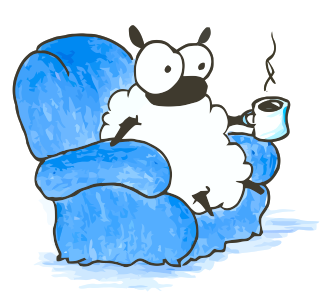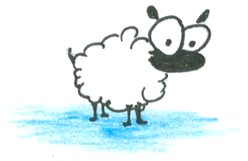Once, a doctor once told me that caffeine can cause fatigue.
I raised my eyebrows in a doubting manner which failed to impress.
“It makes you more alert when you have it - high. But then later, you‘re more tired - low.” He said this with accompanying hand gestures and extra sharp pronunciation, as though I was especially stupid, and so I pretended to understand his point. I thought of sugar highs, and how the rise in sugar can lead to a rise in insulin, which depletes your blood sugar so quickly it can lead to severe lows, fainting, and even seizures in hypoglycemic people. The high is followed by a low. I guess that kind of makes sense.
Except…no.
Never mind that this doctor, on the whole, was an incompetent idiot who’s tenure in a student health clinic, I can only assume, was due to his inability to work elsewhere, combined with a thrill of lording over wee female undergraduates with his creepy medical degree and skullular bank of incorrect knowledge. No matter who said that caffeine can make you more tired, and whether or not they possess a working medical licence, they are wrong. It simply isn’t true.
Caffeine is a drug. And most drugs have withdrawal symptoms when your body is used to getting said drug after an extended period of time. Simplistically, this is the approximate opposite of the drug effect itself - a high to a low, so to speak. Speed fiends know that coming off of stimulants equals a brief period of depression…you are hungry, and sleepy, and your mood is low. (Speed, or amphetamines, makes people awake, happy, and thin. And then psychotic...but that comes later.)
But sometimes, the withdrawal effects have little to do with the direct effects of the drug.
Take alcohol, which has the most deadly withdrawal effects of any known addictive drug, which typically start with ‘shakes’ and progress to full-on, grand-mal seizures. And heroin withdrawal, which approximates a bad bout of the flu (though heroin is not known for making people feel un-flu like, at least as far as I know). And anti-depressants, which may make you sad in withdrawal, but may also make you sweaty, or nauseous, or confounded by a disturbing phenomenon of ‘brain zaps.’
Withdrawal effects are more about your body coping with a drug’s absence after that drug has become a part of its homeostatic system…but homeostasis involves a lot of different chemicals in a lot of parts of the body, and so the opposite-effect, high-to-low rule may not hold.
And then there is caffeine.
Caffeine, like speed, is a stimulant. It is far less effective than meth, cocaine, or speed itself, but it happens to be legal and cheap, making it far more appealing to yours truly and, likely, some of you. It increases intracellular metabolism, causing every affected cell in your body to work just a little bit harder and faster. It increases urination, and it dilates blood vessels throughout your body. If anyone in the world were on an IV of strong espresso, as you may have dreamed of trying during your undergraduate years, their pupils would be huge. In massive doses, it can make you jittery and keep you up at all hours, pacing restlessly, jabbering nonsensically, and not once sitting down to write the paper that caused you to drink three cans of Redbull in a row.
And after staying up all night, you’ll likely feel tired. But if you’d stayed up all night anyways, without the Redbull or the chocolate-covered espresso beans (which Starbucks sells and are delicious!), then you’d likely be tired just the same. In fact, you'd probably be more tired. And caffeine might make you sleep poorly, when you do get to sleep, which can lead to later fatigue…but that’s really just because you’ve now been partially awake for forty odd hours, and so naturally you’re feeling exhausted.
You can certainly ‘crash’ after getting hopped up on caffeine (a practice which is also common among meth and crack addicts), but the net amount of sleep you get in the end - even if it may resemble a coma - will be much less than if you hadn’t had a stimulant at all. Stay up for two nights, sleep like the dead for twelve hours…that’s still only four hours of sleep per night, averaged out. And few people will sleep for more than eleven hours at a time, no matter how exhausted they may be beforehand (including a guy who stayed up for seven days straight in the seventies, on the radio, until he hallucinated that his microphone had become a snake. This led to him screaming, on air, for six minutes straight, and eventually his being sent home.)
The concept of ‘sleep debt’ has some pseudo-psych merit, but the major failure of the concept occurs when sleep debt maxes out. After eleven hours straight sleep, and the ensuing grogginess, the most sleep-indebted crack fiend or radio host will have hit the diurnal 'reset button' and be right as rain. Credit card debt should work that way.
And so…caffeine. Caffeine certainly is addictive and, judging by the line-ups at Starbucks in the morning, many a Westerner has succumbed to its exotic and bean-based nectar. The decaf pot remains untouched and stagnant, and slightly more popular than the ever-confusing alcohol-free beer. The majority of North Americans have a mild to moderate caffeine addiction, and that's perfectly okay; it lowers your risk of Parkinson’s (as do cigarettes!), and heart doctors only get really upset when you tip the scales at more than eight cups per day.
But not all doctors, it seems.
If you’ve got a daily drug habit in the form of coffee or cola, you’ve likely had occasions where that morning cup could not be obtained and you’ve experienced some nasty side effects as a result. You may have felt sluggish, or found you just couldn’t wake up…or at least, not with the regular spring in your step that only artificially stimulation brings. And if you have a heavier habit, you may have found your head throbbing mercilessly - a headache which will go away after a day or so, or be instantly relieved by the precious gift of more, addictive caffeine.
This headache isn’t a result of a slow-down in your metabolism. It’s to do with the blood-dilation effects of caffeine, and the blood vessels in your head freaking out and constricting in caffeine’s absence. Excedrin remains an ever-popular pain killer because, unlike its fellow NSAIDS (like Aspirin and Advil), it contains just a touch of caffeine, which helps fight headaches in general but is especially great for the throbbing terror of withdrawal.
And my final point…Caffeine is a stimulant.
It stimulates; that is the class of drug it belongs to, and if it were a cause of net fatigue, it would not be classified as such. And the entire argument of net-opposite-effect is spectacularly ridiculous when you consider its implications - does taking a sleeping pill, or an anti-anxiety drug, then make you more alert the next day? Does drinking a beer, after it’s worn off, lead to you being extra, extra sober?
No. No it does not.
Stupid doctor, I rest my case.
Monday, July 6, 2009
Subscribe to:
Post Comments (Atom)





No comments:
Post a Comment